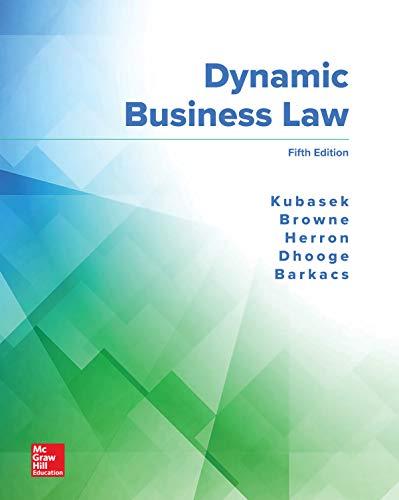Rule 1:21-1C(a)(3) of New Jersey statute N.J.S.A. 42:1A-18 requires attorneys in a Limited Liability Partnership to have
Question:
Rule 1:21-1C(a)(3) of New Jersey statute N.J.S.A. 42:1A-18 requires attorneys in a Limited Liability Partnership to have malpractice insurance. If an LLP does not have malpractice insurance, it is stripped of its LLP status and is instead considered a general partnership, leaving the partners vicariously liable.
In 2009, Mortgage Grader, Inc., hired John Olivo of Ward & Olivo, LLP (W & O), to litigate a patent infringement case. Mortgage Grader entered into a settlement agreement that could only be considered poorly thought out. The settlement agreement stipulated a one-time settlement payment to Mortgage Grader and granted the defendant perpetual rights to use any patents Mortgage Grader owned regardless of their relationship to the patents at issue. Mortgage Grader eventually sued W & O, John Olivo, and John Ward for malpractice in 2012, asserting that the settlement agreements harmed Mortgage Grader’s patent rights.
By this point, W & O had dissolved and entered a windup period. W & O still existed for the purpose of collecting outstanding fees and paying taxes. While W & O had malpractice insurance until August 2011, it did not purchase a “tail policy” for coverage beyond the effective date of the policy. Furthermore, John Olivo did inform Mortgage Grader of the termination of legal services until May 2012.
Mortgage Grader had sued not only W & O, but the partners as well, including John Ward, who had not worked on the patent case. John Ward moved to dismiss for failure to state a claim. Ward argued that because the LLP had malpractice insurance while it practiced law, it fulfilled the requirements of the New Jersey state law. As a result, Ward proclaimed the LLP’s liability shield kept him from being held vicariously liable for John Olivo’s alleged negligence.
Mortgage Grader contended that W & O had not met the malpractice insurance requirements because it was still in operation during its windup period. Since W & O did not have tail coverage, it failed to meet the insurance requirements and left John Ward exposed to vicarious liability. The court rejected John Ward’s motion to dismiss but the appellate court reversed its decision. The case then made its way to the New Jersey Supreme Court following Mortgage Grader’s appeal. At the root of this case is whether Rule 1:21-1C(a)(3) requires law-firm LLPs to maintain malpractice insurance during its windup period. Search the rule online. Based on its text, do you think W & O met the rule’s requirements? Why or why not? How did the New Jersey Supreme Court rule and what was its reasoning?
Step by Step Answer:

Dynamic Business Law
ISBN: 9781260247893
5th Edition
Authors: Nancy Kubasek, M. Neil Browne, Daniel Herron, Lucien Dhooge, Linda Barkacs





